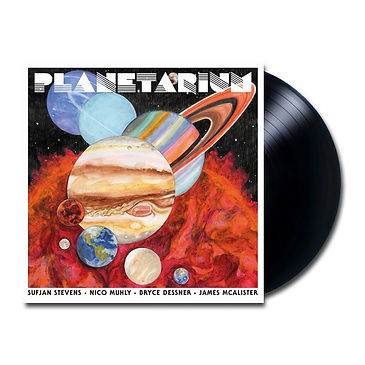

Planetarium
by Stevens/Dessner/Muhly/McAlister
4AD
Similar to Gustav Holst's famous orchestral suite, “Planetarium” is another journey through the Solar System, concentrating on the mythological nature of the planets but this time mixed with philosophical themes of human nature and our relationship to the environment and society. This album is an ultra-modern soundscape of programmed beats, synthesisers and electronically-manipulated vocals that is longer than Holst's work, providing not only tracks for every planet (including our favourite dwarf, Pluto) but also the Sun, the Moon and other celestial entities such as Halley's Comet, the Kuiper belt and even a Black Hole.
Planetarium was commissioned by the Dutch concert hall Muziekgebouw Eindhoven from contemporary classical music composer Nico Muhly. He put together a “supergroup” for the project, bringing on board popular singer-songwriter Sufjan Stevens, drummer/electronic music wizard James McAlister and Bryce Dessner of the indie rock band “The National” on guitar. The group toured the performance across the globe between March and July 2012. Still, it was not released as a studio album until 2017 on the independent record label 4AD.
The language of synthesised electronics, complex horn and string arrangements and manipulated vocals create a very varied and chaotic soundscape. At over 75 minutes long, there is so much going on in this album that it is difficult to get to grips with on the first listen-through. Its structural complexity is compounded by many tracks having numerous distinctively different passages, often changing quite dramatically halfway through, and with some tracks blending seamlessly into others, this makes it difficult for individual songs to stand out. In addition, Sufjan’s lyrics do not follow any conventional verse-chorus structure but have a much more freeform format. I can understand why Kitty Empire of The Observer called this album “digital mayhem” but that's a bit harsh. Repeated listening affords greater understanding and appreciation of all the different passages and movements in this celestial journey and Planetarium then definitely begins to grow on you.
Akin to Holst's work, the Solar System objects are not presented in positional order. This time we begin the journey with the outermost planet, “Neptune” which is a pleasant but unremarkable piano-driven ballad that plays like an intro but doesn’t evolve into much more. The album then really takes off with a fantastic sonic adventure “Jupiter” that gives a better prelude to the wonders in store in Planetarium. Starting with a slow “stomp, stomp, clap” pattern beat, this track changes halfway with a pad/chord bridge to the catchiest section which will have you singing along with the infectious “Jupiter is the Loneliest Planet” hook. Be prepared to dive under the table for cover as the machine-gun beat drops at 5:07 before leading to the big horn & guitar finish.
Jupiter's lyrics start with Sufjan's natural voice before becoming manipulated “vocoded” vocals in the second part of the track. When performed on stage he will have two different microphones rigged up for this effect. The sound of a heavily manipulated voice is a bit of an acquired taste. It is overplayed in some parts of Planetarium such as on the track “Mars”. This is meant to be a study of the relationship between war and love, however, you will be reaching for the lyric sheet to understand what is said by the distorted voice. To some extent, this voice alludes to an alien/Martian source and the twittering & bleeping ray-gun sci-fi noises at the beginning of the track evoke a bit of Jeff Wayne's “The War of the Worlds”.
Midway through the album the Black Energy/Sun/Tides trio provide an interlude of a more familiar synth space ambience. It would have been interesting if these had blended into each other. Still, they are kept separate probably because of their diversity in subject matter. The track “In the Beginning” leads into “Earth” providing an ambient introduction for a 16.5-minute composition that dominates the second half of Planetarium and represents an epic aural journey in itself. Earth builds slowly for four minutes before Sufjan's vocal arrives and becomes bolstered by swelling horns and euphoric choral “alleluia” chants to stir your emotions.
Looking at download numbers as well as reviews and comments on the internet, the last track “Mercury” is the most popular song on the album. It comes as no surprise that Stevens’ vocals are untreated on this pacey, piano, and later guitar-driven, pop ditty perfectly apt for the swift messenger god.
All in all, a strange and varied album that may not hook you instantly but will definitely grow on you with repeated listens. You’ll certainly have fun wrestling with the meaning of Sufjan’s lyrics as you traverse this obstacle course of different passages and sounds that never lacks for variety. It has left me wondering: is Planetarium merely “good” or a work of genius?
Rating
For the physical double LP and deluxe CD booklet set eleven artists were commissioned to create special portraits of the planets, Pluto, the sun and the moon. These impressive pictures are presented on individual 12" cards slipped into the album’s gatefold sleeve or on a page in the CD booklet: Jessica Dessner (cover image), Cecily Brown (Earth), Marcel Dzama (Moon), Stephen Halker (Mars), Jim Hodges (Neptune), David Huffman (Uranus), Karl Jensen (Sun), Ragnar Kjartansson (Pluto), Mehreen Murtaza (Mercury), Matthew Ritchie (Saturn), Saya Woolfalk (Venus), Nathlie Provosty (Jupiter, back image).


